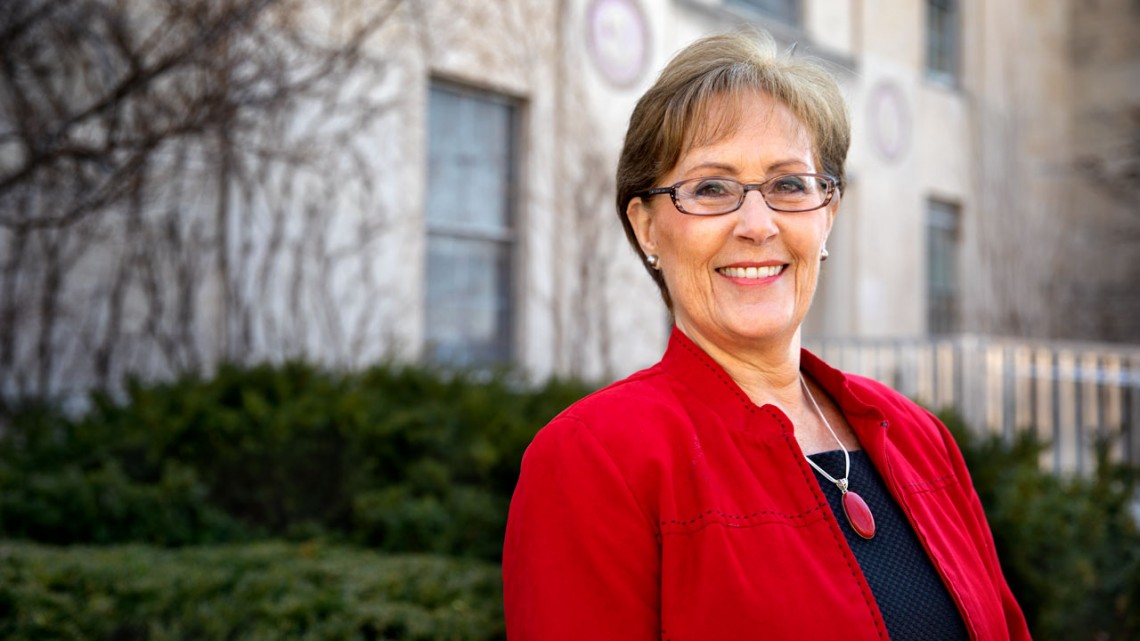
Connie Mabry, director of the Office of University Commencement Events.
Mabry celebrates 30 years orchestrating Commencement
By Nancy Doolittle
Two weeks before Commencement in 1989, Connie Mabry stepped into a role that has defined her career.
As director of the Office of University Commencement Events, Mabry has orchestrated the graduation ceremonies over the tenure of six university presidents – Frank H.T. Rhodes, Hunter R. Rawlings III, Jeffrey S. Lehman, David J. Skorton, Elizabeth Garrett and Martha E. Pollack. While much has remained the same since she first took over 30 years ago, much also has changed.
Mabry now is assisted by about 80 Commencement committee members and hundreds of staff volunteers from all across campus. The event’s documentation has morphed into a 100-page manual; planning for the December and May Commencements begins in September; and all of the housing, dining and transportation logistics that were handled through phone calls and mailings to parents have been moved online.
Now, Mabry said, unless the weather threatens otherwise, “by Sunday morning’s ceremony, I essentially sit and watch.”
The logistics of Commencement weekend are fairly constant, she said. About 5,500 graduating seniors and professional and graduate students attend the May ceremonies annually, with about 22,000 parents, family members and friends from around the world coming to watch. “Some years we have more and some less, but over time it averages about the same,” said Mabry. “We have enough chairs in Schoellkopf Field to accommodate any number of students attending.”
That assumes it does not rain or there isn’t severe, dangerous weather. In that case, Barton Hall is available for the soon-to-be graduates for their ceremony; guests would need to view the event remotely. Barton has never been used for this purpose, though it came close in 2016 and again last year.
“In ’92, we had a cold drizzle,” recalled Mabry. “It never got above 40 degrees, when the forecast had been for the low 60s. People were not prepared for the chill, having donned sundresses and short sleeves and coming without rain gear or umbrellas. President Rhodes shortened his speech so those attending would not catch cold.”
In 2016, two five-minute, pop-up downpours came and went, while the procession was well underway to the stadium, Mabry said. But, for safety reasons, in what is likely the shortest commencement ceremony in Cornell’s history, Provost Michael I. Kotlikoff graduated the students en masse, with a two-sentence conferral statement for all degrees.
In 2018 it rained, but the temperature was warm, so participants did not mind getting wet.
“We have plans for any contingency,” said Mabry. “Short versions, emergency versions – about five different plans.”
This year, a number of the smaller college events have been shifted from Sunday to Friday so buildings can be used instead of tents for their venues. “However, a few events will still be held in tents, because we do not have enough venues large enough for everyone to be indoors,” Mabry said.
But even the smallest changes can have unintended ripple effects. In moving from Sunday to Friday, college events had to be scheduled late enough in the day to free up parking and roadways after staff leave campus from a normal work day, Mabry said. “What looked like a simple change could have created end-of-day vehicular congestion and confusion if we had not looked at the big picture.”
Also changed: Under Rhodes, a special Ph.D. recognition ceremony was added to the May Commencement Weekend in 1993. The December graduates had been attending a reception until 2003, when Lehman made it a full graduation ceremony. “We just celebrated our 15th December Commencement in 2018,” Mabry said.
What keeps Mabry at the helm? “Every year of planning is different, with different challenges and opportunities,” she said. “In general, there is a gentle ramp-up from early planning to the big day. We work really hard, but there is an endpoint, a time when that year’s Commencement is over. Whether you are a volunteer, a visitor or one of the many staff working the event, you get to see the results of your work, with students and parents celebrating milestones reached. Commencement is a wonderful event to be part of, and I appreciate the entire university’s staff who help make it great.”
Media Contact
Get Cornell news delivered right to your inbox.
Subscribe
